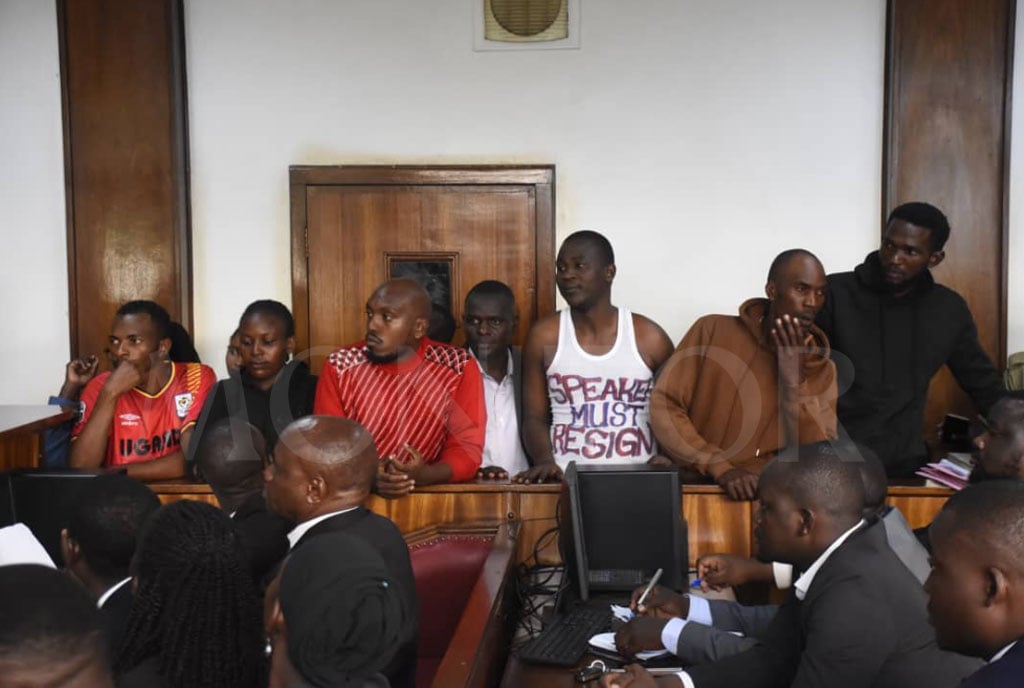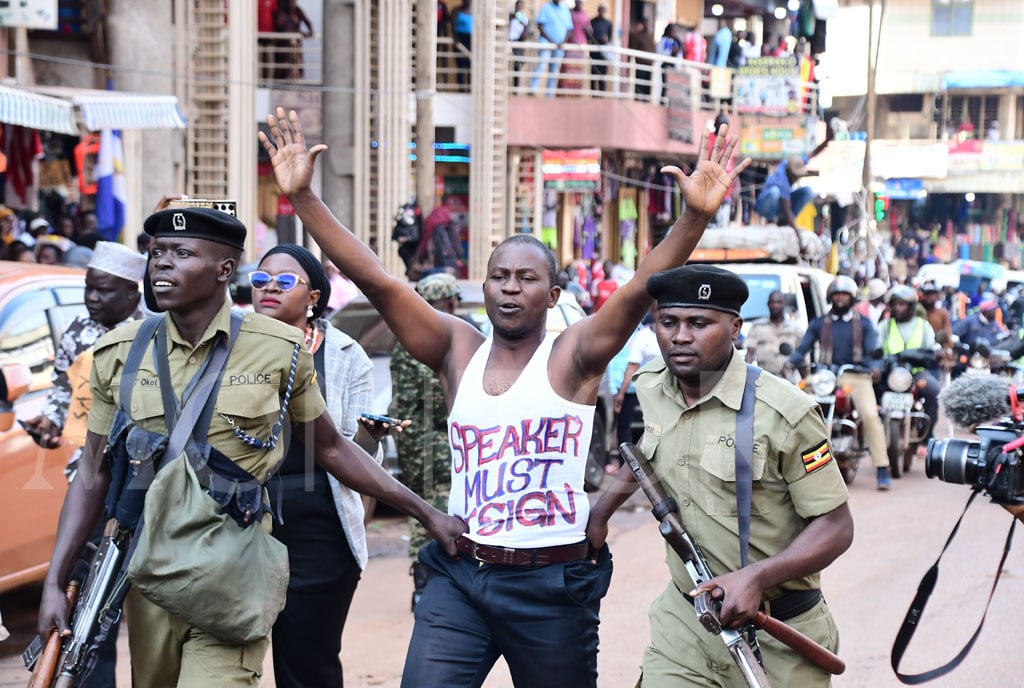
Some of the July 23, 2024 March to Parliament protesters are seen in the dock at Buganda Road Chief Magistrates' Court on the same day. PHOTO/ISAAC KASAMANI
The government on July 23 projected an overwhelming power, placing the capital Kampala on a security lockdown, to thwart a march on Parliament by activists over alleged corruption in the House.
Operatives drawn from the military, police and intelligence agencies marshalled in the city centre and its outskirts, which in the past were flash points for anti-government demonstrations.

A heightened security presence is visible in Kampala, with armored vehicles and personnel patrolling the streets. Photo | Abubaker Lubowa
Armed to the teeth with AK-47 assault rifles and more sophisticated guns, the uniformed and non-uniformed officers ringed off roads, crucially those leading to Parliament building on Parliamentary Avenue.

Counter Terrorism Unit personnel patrol Parliament Avenue on July 23, 2024. PHOTO/MICHAEL KAKUMIRIZI.
Armoured cars patrolled the capital in which teargas trucks were positioned at main road intersections a day earlier to confront demonstrators, who pre-announced a march to demand, among others, the resignation of Speaker Anita Among over corruption claims.
The British and United States governments in April and May, respectively, imposed travel, financial and asset freeze on the Speaker of Uganda’s 11th Parliament, alongside former Karamoja Affairs ministers Goretti Kitutu and Agness Nandutu, accusing them of “theft”.
The trio deny any wrongdoing, with Ms Among saying she is a victim of a witchhunt by homosexuals and their lobbyists displeased by the enactment of the May 2023 anti-gay law under her watch.
Citing the sanctions by foreign governments and President Museveni’s public disclosure in June that he had proof that lawmakers were colluding with accounting officers and Finance ministry bureaucrats to make allocations in the National Budget in exchange for bribes, the demonstrators decided that the institution had lost its way and its leadership must fall.
In the President, the anti-graft crusaders saw an ally, or so they thought, after Mr Museveni, during a July 5, feté at Kololo Ceremonial Grounds in Kampala to celebrate his achievements, proclaimed that revolutionaries of his ilk, patriots and victims of corruption – which is what yesterday’s marchers cast themselves to be – would work together to “crush” corruption.
This was against a backdrop of a report by the government Ombudsman that thieving bureaucrats pilfer more than Shs9 trillion annually, prompting the head of state to proclaim graft as the country’s “biggest problem”.
That was more than a month ago and, as the adage goes, a day is long in politics for changes not to happen.
Thus, as reality dawned that an anti-graft demonstration organised mainly on social media was likely, the President developed other thoughts: a demonstration was unnecessary, dialogue with his participation should be prioritised and those who transgress would be “playing with fire”.
Police took a cue, declaring during their weekly press conference that the peaceful demonstration would not be permitted due to risk of it being hijacked by rogues.
The warnings by the country’s chief political executive and law enforcement, which organisers of the demonstration dismissed as unconstitutional, rapidly translated on the ground into rapid heavy security deployment that gave Kampala the portrait of a garrison.
At daybreak on July 23 under clear skies, contrasting a drenched Monday, police in anti-riot gear, regular and military police slinging rifles, plain-clothed spies and elements of Special Forces Command (SFC), massed in strategic positions to command mobility.

Policemen arrest a man as Ugandans began a March to Parliament anti-graft protest in Kampala on July 23, 2024. PHOTO/ABUBAKER LUBOWA
A number of roads were closed, among them King George IV Way and Siad Barre – both connecting to Parliament from Railways Ground where the marchers aimed to assemble. Kimathi Avenue, which connects to Parliamentary Avenue, was also blocked.
Nile Avenue, which to the north belts both Parliament building and Kingdom Kampala, where offices for several MPs and presidential advisors are situated, was turned into a one-way from Kintu Road round-about, causing bumper-to-bumper traffic.
By roadsides, outside shopping malls, atop tall buildings, operatives deployed in a manner leaving nothing to chance.

Security personnel arrest a demonstrator during the March to Parliament anti-graft protests in Kampala on July 23, 2024. PHOTO/MICHAEL KAKUMIRIZI
Still, some of the demonstrators dared, but not without consequences. In the running battles, on a much-subdued scale, security forces corned, beat up, and arrested dozens who were driven away at breakneck speed for detention at Central Police Station Kampala, Kawempe Police Station and Jinja Road Police Station.
Within hours, the facilities were brimming with suspects, adding to congestion with suspects in the cells for different offences.
Pro bono lawyers and other activists, among them Ms Mercy Munduru and Ms Maria Alesi, stormed the stations, demanding unconditional release of the suspects.
Behind the scenes, law enforcement worked with the public prosecutor on charges, and before long, the arrested individuals were hauled into police vehicles and driven to Buganda Road and Nakawa Chief Magistrate’s courts, where they were indicted for being a public nuisance.
Among them were KFM Radio presenter Salima Faiza; Thomas Kanzira, Bernard Olupot, Edgar Hamala, and Aljab Musinguzi --- all arrested from Oasis Mall on Yusuf Lule Road.
It was, as for their incarcerated colleagues, a dead end of a day of high drama during which the headquarters of the Opposition National Unity Platform (NUP) party in Makerere Kavule and the National Theatre, adjacent to Parliament building, were sealed off.
On the micro-bloging site, X, the anti-corruption crusaders ran a #AnitaMustResign hashtag from unknown locations that security forces, in a desperate bid to locate them, tailed journalists they believed knew the whereabouts of the demonstration planners.
“Where are you going, where are they coming from, please help us and direct us,” one of the police asked the journalists as they headed to Kingdom Kampala Building on Nile Avenue.
Their panic was not in vain. Moments earlier, activist Habib Buwembo, a NUP member, joined by colleagues from Lubaga Social Justice Centre, had beaten the multi-layered security ring to emerge at Arua Park, a business and transportation hub rife with daredevils.

Policemen arrest a man as Ugandans began a March to Parliament anti-graft protest in Kampala on July 23, 2024. PHOTO/ABUBAKER LUBOWA
Donning a black trouser and a white vest inscribed with the words, “Speaker Must Resign”, Mr Buwembo led demonstrators shouting anti-Parliament slogans from the terminal onwards to Mapeera House on Kampala Road where a joint security force intercepted and arrested them.
More regular and military police deployed shortly afterward.
At around 11am, another group led by David Musiri and Victor Otieno, co-organisers of the demonstration, emerged from one of the buildings on Nasser Road, chanting “Anita must resign” and signing revolutionary songs that National Resistance Army rebels sang in the bushes to morale boost during the five-year guerrilla war that brought President Museveni to power in 1986.
These first detoured from Printer’s Miracle Arcade towards the Railway Grounds, the protestors originally designated assembly point for the march to Parliament, which is under 100 metres away, before cutting corners to Uganda Cooperative House onwards to Nkrumah Road Police Post. Military police cornered and arrested them.
A few minutes after the Nkrumah Road incident, protester Eriah Nuwenuwe, a human rights lawyer, outsmarted security operatives and emerged at the highly-guarded Parliament main gate.
“If I wait for my colleagues to come, they will delay me,” he told a battery of journalists as he grabbed a nearby placard and wrote their day’s slogan, ‘Anita must resign’.
He rallied reporters to join him because, as he put it, “we are tired of corruption in this Parliament”.
“At the end of the day, it’s us young people suffering,” he added.
As many roads remained closed, some businesses operating on Parliament Avenue and Kimathi Avenue, in the civic centre of the capital, suffered a day without clients --- kept away by heavy security ring.
“You either show your work ID or you march back,” one of the police officers at National Theatre said to a man intercepted on Parliamentary Avenue.
“No business here today. This route is always busy. Now, with this deployment, do you expect anyone to come this way?” said a female mobile money agent who identified herself by one name, Carol.
“Uganda’s youth should keep in mind that Uganda is not like Kenya where they have a lot of freedoms,” the mobile money agent said in reference to the Kenyan Gen Z demonstrations that forced President William Ruto to dissolve his Cabinet and are believed to have inspired yesterday’s march.
After a brief detention at Jinja Road Police Station, they were hauled to Nakawa Chief Magistrate’s Court and charged with being public nuisance and remanded until July 30.
Soldiers and police saturated Kampala’s Ntinda outskirt, where they quickly encircled six youth assembling to start a demonstration, driving them off in a numberless white pick-up truck to Kawempe Police Station.
Security was iron-clad at Bwaise Round-about, where the highway to northern Uganda and the Northern Bypass intersect.
Our journalists using the uniforms identified those standing guard to be drawn from the elite SFC, regular army, police and intelligence agencies.
In Kamwokya, a slum and Opposition bastion, there was carpet security, with soldiers and police deployed in markets and patrolled streets, stretching to Nakawa junction and onwards to Mbuya, the army headquarters.
Largely unsuccessful, and with some in jail, the demonstrators and activists knew firsthand that corruption could only be fought if President Museveni willed and on his terms, despite security forces being comparably less brutal.
What they say about the protests...

Ms Sarah Bireete
Sarah Birete, human rights defender
The youth, who form the majority of the population in Uganda, have a right to ensure their demands and wishes are implemented by the leaders. The youth are fed up with corruption and opulence of leaders and they are justified to fight back.

Robert Kyagulanyi, aka Bobi Wine, NUP president
The cowards have been picking up young people whose only crime is lifting up a placard and chanting ‘stop corruption’. I encourage everyone to be a brother’s or sister’s keeper at this critical time.

Ali Munira, IGG spokesperson.
The Inspectorate of Government has been calling upon the public to stand up and say no to corruption. However, we ask them to bring the information on corruption to our office with supporting evidence where possible that will help us to prosecute [the culprits].

Aron Kiiza, lawyer and human rights defender.
The protest has united the nation and injected momentum in the fight against corruption. The police and military panic and overreaction show the potency of online and street activism, especially when applied together.

Pius Felix Osillo, medical doctor.
I wouldn’t feel at peace watching this demonstration over the news or social media yet this is affecting all of us. So I am here to offer free medical services to those who may be injured in the demonstration so as to save a life.

Marlon Agaba, ED, Anti-Corruption Coalition Uganda.
...like we have seen, there have been heavy security deployment, which shows the government is already afraid of its people, but it also shows government is not committed to addressing challenges raised in regard to corruption.

Kiryowa Kiwanuka, Attorney General.
I think demonstrations are part of the ecosystem for fighting corruption, because corruption is fought by the agencies and the public. It is the public that sees what happens and thus report it.

Shamim Nambassam former Makerere guild president.
I salute the fearless individuals who participated in yesterday’s march and all those who have added their voices to this struggle. Their actions are a testament to their commitment to a better future.
Compiled by Priscilla Maloba
Reported by Busein Samilu, Karim Muyobo & Stephen Otage


